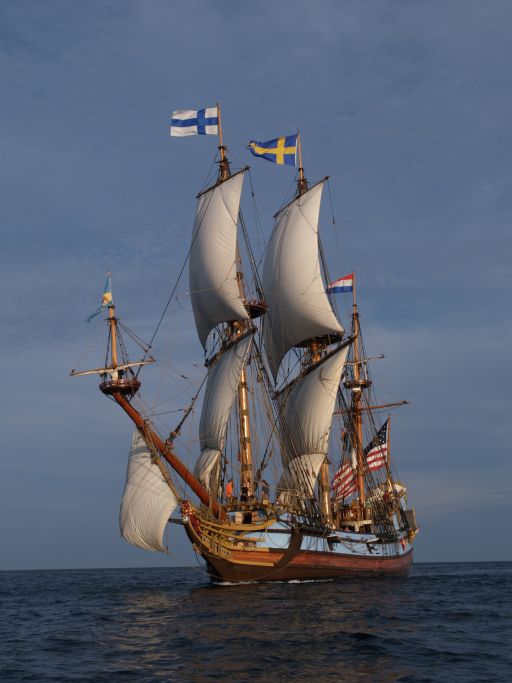WILMINGTON – DNREC’s Division of Waste & Hazardous Substances and the Kalmar Nyckel Foundation invite the public to join in an event at 2 p.m. Tuesday, Oct. 18 showcasing established sustainable landscaping at the Kalmar Nyckel Foundation shipyard, 1124 East 7th Street, Wilmington, DE 19801. The event will feature Dr. Sue Barton, associate professor and extension specialist at the University of Delaware, who will discuss the importance of using native species to create a sustainable landscape, such as the bioswale at the Kalmar Nyckel Foundation site, which was planted one year ago and already graces the former Brownfield site.
Speakers also will include Marjorie Crofts, director of DNREC’s Division of Waste & Hazardous Substances, who will speak on the Brownfields cleanup and redevelopment of the Kalmar Nyckel Foundation site; and Matt Sarver of Sarver Ecological, LLC, who will provide information on the native plants used at the site. Site tours and information about sustainable landscaping projects also will be available at the event.
“The Brownfields redevelopment of the Kalmar Nyckel Foundation shipyard and the sustainable landscaping of the bioswale area is a real testament to the dedication of so many people, most notably, Dr. Sue Barton and Matt Sarver, who donated their services in designing the plantings,” said DNREC Deputy Secretary Kara Coats. “This was a huge collaborative effort, using pick axes and augers, as well as shovels and a lot of sweat in height of the summer heat to achieve the planting of over 4,000 wildflower and grass plants, along with 400 shrubs and trees at the site.”
“DNREC’s strong partnership with the Kalmar Nyckel Foundation and their commitment to the conservation and stewardship of our historic, cultural and environmental resources, has resulted in the sustainable landscaping at the site, now established beautifully for all Delawareans and visitors to enjoy,” Coats added.
The Kalmar Nyckel Foundation shipyard is the ship’s home port and site of the foundation’s maritime center and educational programming. It is adjacent to the landing place of the original Kalmar Nyckel, a Dutch-built merchant vessel which led a group of ships that brought the first Swedish and Finnish settlers to the Delaware Valley in 1638. Built, maintained and operated by the Foundation as a re-creation of the original 17th century ship, the current Kalmar Nyckel was recognized as Delaware’s official “Tall Ship” by Governor Jack Markell in a formal bill signing Sept. 9.
The many volunteers who participated in the massive planting of native species at the shipyard site include DNREC’s Site Investigation and Restoration Section (SIRS) staff, who administer the Brownfields Development Program; members of the Hazardous Substance Cleanup Act (HSCA) Advisory Committee’s Ecological Revitalization and Green Remediation Subcommittee; Kalmar Nyckel volunteers and staff, and EA Engineering, Science, and Technology staff, who co-designed and managed the project for SIRS.
The shipyard is a Brownfield site owned by the City of Wilmington that was cleaned up through Delaware’s Brownfields Development Program, which is administered by DNREC’s Division of Waste & Hazardous Substances. The approximately 2.2-acre site was formerly part of the Jackson and Sharp American Car Foundry railcar manufacturing and shipping operations. Remediation activities were completed in 2015. “The sustainable landscaping project was developed to demonstrate the economic and aesthetic value of landscaping with native plants on Brownfields and other remedial sites,” Director Crofts noted, “but the completed project has far exceeded initial expectations.”
“This project has become quite a success story, demonstrating the value of supporting native wildlife on small sites, especially in urban areas, as well as providing quality of life benefits for nearby residents, with the enhanced aesthetics and presence of native wildlife that go hand-in-hand with native plantings,” Crofts said. “Our work here takes Brownfields development to a new level of environmental protection by not just removing or sequestering contaminants under pavement or soil/lawn, but actually beginning to revitalize the local ecosystem, making the site truly productive in an ecological, as well as an economic sense.”
This fall, it is easy to see how the native plantings at the Kalmar Nyckel Foundation site are already successful in attracting large numbers of butterflies and other beneficial insects. These in turn are expected to support increased populations of native birds in future years. SIRS and the Kalmar Nyckel Foundation will be studying the site as the plantings become more established to document wildlife usage, as well as the maintenance costs and the ecological and quality-of-life benefits of urban redevelopment.
For more information about sustainable landscaping, including the Kalmar Nyckel Foundation project, please contact Kate Durant at 302-395-2600 or email Kathryn.Durant@delaware.gov.
For more information about the Kalmar Nyckel Foundation, visit https://kalmarnyckel.org/.
Media contact: Joanna Wilson, DNREC Public Affairs, 302-739-9902
Vol. 46, No. 346
-30-
